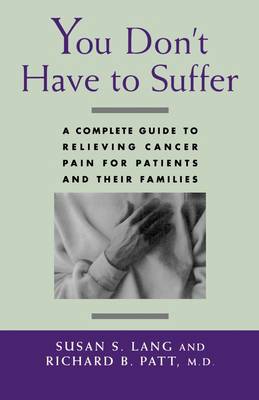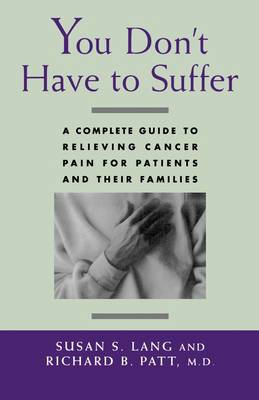
- Retrait gratuit dans votre magasin Club
- 7.000.000 titres dans notre catalogue
- Payer en toute sécurité
- Toujours un magasin près de chez vous
- Retrait gratuit dans votre magasin Club
- 7.000.0000 titres dans notre catalogue
- Payer en toute sécurité
- Toujours un magasin près de chez vous
You Don't Have to Suffer
A Complete Guide to Relieving Cancer Pain for Patients and Their Families
Susan S Lang, M D Richard B Patt, Lang
Livre broché | Anglais
76,45 €
+ 152 points
Description
On March 2, 1994, the Agency for Health Care Policy and Research (a division of the Public Health Service) made headlines by releasing new cancer pain management guidelines. That report revealed that pain is frequently undertreated, and that relief is not only possible for most patients, but actually aids in recovery. For many cancer victims, the agency's guidelines offered new hope; for Dr. Richard B. Patt and coauthor Susan S. Lang, it was a resounding vindication of the findings they set forth in You Don't Have to Suffer.
Written by one of the country's leading cancer pain experts and science writer Lang, You Don't Have to Suffer provides an invaluable, no-nonsense handbook for anyone with cancer, for anyone caring for a loved one with cancer, and for the doctors and nurses who treat these patients. The authors first illuminate the reasons why patients are so often undermedicated, including unfounded fears of addiction, patients thinking they need to tough it out, time-consuming paperwork for doctors who prescribe narcotics, and laws that fail to distinguish between drug abuse and the legitimate employment of narcotics. In a careful argument now taken up by the AHCPR's guidelines, Lang and Patt demonstrate that properly medicated patients are better able to resume active lives and marshall strength to fight their disease--while those in chronic pain not only suffer, but also may jeopardize their potential for recovery.
You Don't Have to Suffer explores all the pain-relieving options available in the modern medical arsenal--from drugs and high-tech medical procedures to psychological and cognitive techniques and home nursing tips to make a patient more comfortable. Detailed chapters discuss the medications that can fight cancer pain or relieve the undesirable side effects of chemotherapy, radiation, surgery, and other cancer treatments; anaesthetic and neurosurgical options for pain that has not responded well to simpler techniques; ways to prevent or relieve constipation, nausea, drowsiness, and other complaints of cancer patients; and mind/body techniques and other ways of coping with depression and various psychological symptoms that contribute to the relief of suffering.
Pulling together a wealth of long-needed information on the latest medical advances, You Don't Have To Suffer is a volume for the growing numbers of patients, family members, and health-care professionals who are determined to relieve needless cancer pain.
Written by one of the country's leading cancer pain experts and science writer Lang, You Don't Have to Suffer provides an invaluable, no-nonsense handbook for anyone with cancer, for anyone caring for a loved one with cancer, and for the doctors and nurses who treat these patients. The authors first illuminate the reasons why patients are so often undermedicated, including unfounded fears of addiction, patients thinking they need to tough it out, time-consuming paperwork for doctors who prescribe narcotics, and laws that fail to distinguish between drug abuse and the legitimate employment of narcotics. In a careful argument now taken up by the AHCPR's guidelines, Lang and Patt demonstrate that properly medicated patients are better able to resume active lives and marshall strength to fight their disease--while those in chronic pain not only suffer, but also may jeopardize their potential for recovery.
You Don't Have to Suffer explores all the pain-relieving options available in the modern medical arsenal--from drugs and high-tech medical procedures to psychological and cognitive techniques and home nursing tips to make a patient more comfortable. Detailed chapters discuss the medications that can fight cancer pain or relieve the undesirable side effects of chemotherapy, radiation, surgery, and other cancer treatments; anaesthetic and neurosurgical options for pain that has not responded well to simpler techniques; ways to prevent or relieve constipation, nausea, drowsiness, and other complaints of cancer patients; and mind/body techniques and other ways of coping with depression and various psychological symptoms that contribute to the relief of suffering.
Pulling together a wealth of long-needed information on the latest medical advances, You Don't Have To Suffer is a volume for the growing numbers of patients, family members, and health-care professionals who are determined to relieve needless cancer pain.
Spécifications
Parties prenantes
- Auteur(s) :
- Editeur:
Contenu
- Nombre de pages :
- 384
- Langue:
- Anglais
Caractéristiques
- EAN:
- 9780195084191
- Date de parution :
- 01-06-95
- Format:
- Livre broché
- Format numérique:
- Trade paperback (VS)
- Dimensions :
- 139 mm x 216 mm
- Poids :
- 498 g

Les avis
Nous publions uniquement les avis qui respectent les conditions requises. Consultez nos conditions pour les avis.






